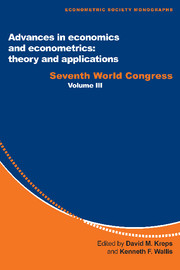Book contents
- Frontmatter
- 1 Causal analysis and statistical inference on possibly non-stationary time series
- 2 Cointegration, long-run comovements, and long-horizon forecasting
- 3 Testing and measurement in competition models
- 4 Empirical equilibrium search models
- 5 Posterior simulators in econometrics
- 6 Restricted least squares subject to monotonicity and concavity constraints
- 7 Bootstrap methods in econometrics: theory and numerical performance
- 8 Econometric models of option pricing errors
- 9 New minimum chi-square methods in empirical
- Index
8 - Econometric models of option pricing errors
Published online by Cambridge University Press: 05 January 2013
- Frontmatter
- 1 Causal analysis and statistical inference on possibly non-stationary time series
- 2 Cointegration, long-run comovements, and long-horizon forecasting
- 3 Testing and measurement in competition models
- 4 Empirical equilibrium search models
- 5 Posterior simulators in econometrics
- 6 Restricted least squares subject to monotonicity and concavity constraints
- 7 Bootstrap methods in econometrics: theory and numerical performance
- 8 Econometric models of option pricing errors
- 9 New minimum chi-square methods in empirical
- Index
Summary
INTRODUCTION
On prefacing his excellent textbook on dynamic asset pricing theory, Duffie (1992) distinguishes two decades to characterize the progress in this field:
First, the “golden decade” (1969-79): “Robert Merton started continuous-time financial modeling with his explicit dynamic programming solution for optimal portfolio and consumption policies. . . . His next major contribution was his continual development of the option pricing formula introduced by Fisher Black and Myron Scholes in 1973.”
Second, the decade after 1979 described by Duffie as a “moppingup operation”: “the various problems have become much more unified under the umbrella of the Harrison-Kreps model.”
Amazingly the end of this second decade (namely the year 1990) was marked by two events:
First, Merton has provided in a single volume his gigantic contribution to “continuous-time finance” through a collection of fourteen previously published papers and five new essays.
Second, Angelo Melino gave at the World Congress of the Econometric Society (WCES) a very stimulating invited lecture on “Estimation of continuous-time models in finance.”
- Type
- Chapter
- Information
- Advances in Economics and Econometrics: Theory and ApplicationsSeventh World Congress, pp. 223 - 278Publisher: Cambridge University PressPrint publication year: 1997
- 48
- Cited by

